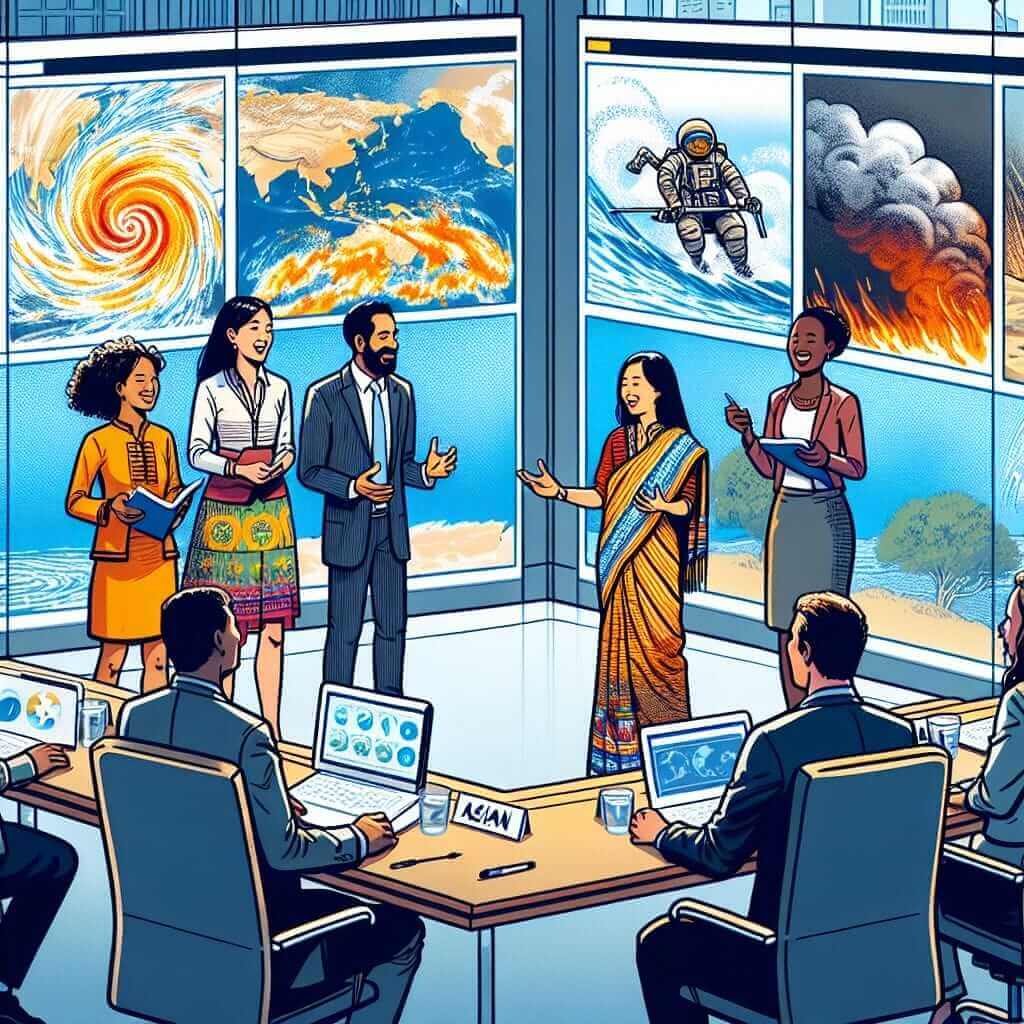The IELTS Reading section is designed to test your ability to comprehend and analyze academic texts. One of the contemporary topics that have appeared in various IELTS exams revolves around climate change and its implications on different aspects of life, including international relations. Understanding this subject can give you a significant advantage in your IELTS preparation.
Given its global relevance, the topic “What are the implications of climate change for international relations?” has frequently made its way into academic discussions and, consequently, IELTS exams. This trend suggests a likelihood of similar texts appearing in future tests, making it a valuable area for practice.
Reading Practice: Climate Change and International Relations
Reading Passage
Climate Change: A Catalyst for International Diplomacy
Climate change is not just an environmental challenge but a profound issue that touches on the economies, security, and political relations of every nation across the globe. As countries grapple with the impacts of rising sea levels, extreme weather events, and diminishing natural resources, the implications for international relations are immense.
Firstly, climate change has become a significant driving force behind international agreements and collaborations. The Paris Agreement, adopted in 2015, is a prime example of global efforts to combat climate change through mutual commitments to reduce carbon emissions. Nations are increasingly recognizing the need to act collectively to mitigate climate risks.
Moreover, the impacts of climate change often exacerbate existing geopolitical tensions. For instance, the melting Arctic ice is opening new shipping routes and opportunities for resource exploration, sparking disputes over territorial claims among Arctic states such as Russia, the United States, and Canada. Similarly, water scarcity driven by changing climate patterns can lead to conflict among nations sharing water basins, as seen in the Nile basin.
Developing countries, which are most vulnerable to the adverse effects of climate change, often face significant challenges. Many of these nations lack the resources to adequately respond to climate-related disasters, thereby becoming reliant on international aid and cooperation. This dynamic can influence diplomatic relations, with wealthier nations potentially leveraging their support for strategic advantages.
Finally, climate-induced migration is emerging as a critical issue. As regions become uninhabitable due to extreme weather or sea-level rise, large populations are forced to migrate, potentially leading to humanitarian crises and strained international relations.

Questions
Multiple Choice
- What is the primary focus of the Paris Agreement?
- A. Addressing water scarcity
- B. Coordinating global trade policies
- C. Reducing carbon emissions
- D. Opening new shipping routes
- Which regions are primarily involved in territorial disputes due to melting Arctic ice?
- A. Middle Eastern countries
- B. South American countries
- C. Arctic states like Russia, the United States, and Canada
- D. African countries
- According to the text, why might developing countries rely on international cooperation?
- A. To enhance their military capabilities
- B. To obtain resources for climate disaster response
- C. To improve their educational systems
- D. To increase trade opportunities
Identifying Information (True/False/Not Given)
- The Paris Agreement was adopted in 2010.
- Climate-induced migration can lead to humanitarian crises.
- Water scarcity has no impact on international relations.
Matching Information
- Match each statement with the correct section (A, B, C):
- ___ The Arctic region is experiencing new shipping routes.
- ___ Developing nations may depend on international aid.
- ___ The Paris Agreement’s role in global climate efforts.
Answer Key
- C
- C
- B
- False (Correct answer: The Paris Agreement was adopted in 2015)
- True
- False (Correct answer: Water scarcity can indeed impact international relations)
-
- A (Second paragraph)
- C (Third paragraph)
- A (First paragraph)
Common Mistakes
- Misidentifying Dates: Ensure accuracy in dates; note that the Paris Agreement was adopted in 2015, not 2010.
- Misinterpreting Cause-and-Effect: Understand the direct and indirect consequences of climate change-related phenomena on international relations.
Vocabulary
- Mitigate (verb): /ˈmɪt.ɪ.ɡeɪt/ – To make less severe, serious, or painful.
- Geopolitical (adjective): /ˌdʒiː.əʊ.pəˈlɪt.ɪ.kəl/ – Relating to politics, especially international relations, as influenced by geographical factors.
- Scarcity (noun): /ˈskeə.sɪ.ti/ – The state of being in short supply; shortage.
Grammar Focus
-
Present Perfect Tense:
Usage: Used to describe actions that have occurred at an indefinite time or have started in the past and continue to the present.
Example: “Nations have recognized the need to collaborate.” -
Passive Voice:
Usage: Used to emphasize the action rather than the subject performing the action.
Example: “The Paris Agreement was adopted in 2015.”
Tips for IELTS Reading Success
- Scan for Keywords: Quickly identify and underline keywords in the questions before skimming the passage for these terms.
- Understand the Context: Contextual understanding is crucial. Don’t just look for exact word matches.
- Practice Different Question Types: Make sure to familiarize yourself with various question types like True/False/Not Given and Matching Information.
By honing your skills on a topic like “What are the implications of climate change for international relations?”, you not only prepare yourself for a potential IELTS question but also engage with a critical global issue of our time. Happy studying!
Related Reading:
- How Does Renewable Energy Adoption Influence International Relations?
- How is Renewable Energy Adoption Affecting International Relations?
Note: Always ensure you practice with authentic materials and seek guidance from reliable IELTS preparation resources.